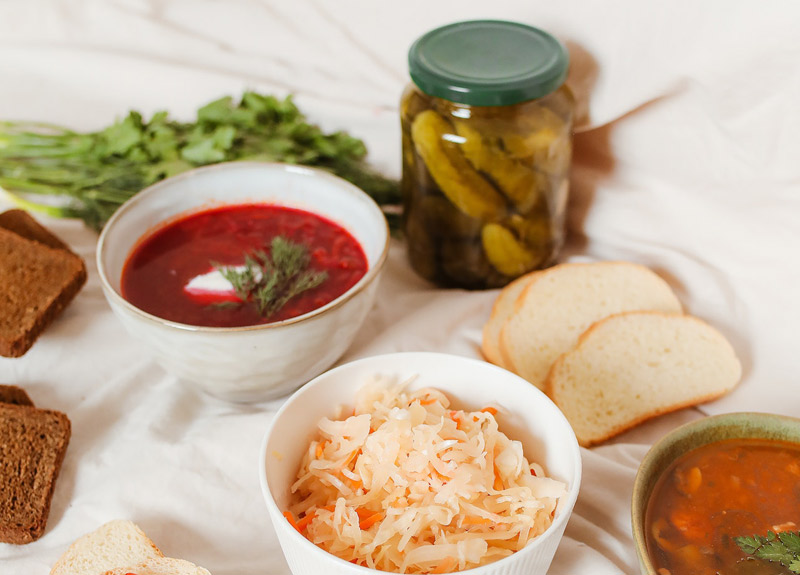A healthy gut microbiome is a complex and dynamic ecosystem of bacteria, fungi and viruses that live in the gut. It plays an essential role in health and well-being, because it helps to regulate digestion, immunity and metabolic processes. ( Skip to table of contents )
But maintaining the balance of healthy gut microbiome can be tricky due to various lifestyle factors such as diet, stress levels and exposure to toxins.
Today we’ll explore how you can maintain healthy gut microbial, particularly its diversity through lifestyle changes, natural remedies, and supplements so your gut stays healthy for years to come.
- The Importance of a healthy gut microbiome
- How to Maintain gut microbiome balance
- Diet, Natural Remedies, Supplements, Lifestyle Changes
- Common Symptoms of Gut Imbalance
- Fiber – soluble and insoluble
- Dietary sources of fiber and top 10 sources
- Probiotics and Prebiotics differences
- Importance of Hydration
- What to Avoid
- Functional Medicine
- Recommended Video – Optimize Your Brain & Gut Bacteria
The importance of a healthy gut microbiome
The gut microbiome is made of lots of different kinds of bacteria, fungi, viruses, and other forms of microorganisms that live inside our gut.
There is a complex, dynamic ecosystem of microorganisms. This system plays a vital role in aiding us with digestion, immunity, metabolism and many other functions for our overall health and well-being.
How to maintain gut microbiome balance
Reducing stress on the gut microbiome:
- One of the best ways is to stay hydrated. Keeping your body hydrated helps keep your digestive system working properly, as water aids in nutrient absorption.
- Eating natural, anti-inflammatory foods has been proven to help protect the gut microbiome from stress. Natural foods are full of nutrients that can replenish the friendly bacteria that is vital for a healthy digestive tract.
- Additionally, eating probiotic rich foods like fermented vegetables and yogurt can restore beneficial bacteria in your gut that can have a calming effect.
- Exercise can also help with reducing stress on the gut microbiome by increasing circulation while supporting metabolic processes and helping break down food substances more effectively in the intestines.
All of these activities combined will reduce stress on the delicate balance between microbes and systems within your digestive tract, resulting in improved health overall.
The gut microbiome plays an essential role in keeping us healthy, so it’s important to maintain gut microbial balance for optimal health. Here are more tips to help you do this:
Diet:
Diet is a key factor in gut microbiome balance as certain foods can promote the growth of beneficial gut bacteria while others can lead to an imbalance.
Eating a whole food diet that is rich in fiber and plant-based foods will nourish your gut bacteria and keep them balanced. Foods such as legumes, vegetables, nuts, seeds and fruits provide prebiotic fibers that feed your gut bacteria and help them thrive.
Fermented foods like yogurt, kimchi and sauerkraut are also great sources of probiotics which can help restore microbial balance.

Natural remedies:
Herbs such as turmeric, ginger, garlic, cinnamon and oregano have antioxidant and anti-inflammatory properties that help support gut health. Other natural remedies like apple cider vinegar, Manuka honey can also be beneficial for balancing gut microbiota.
Supplements:
Taking targeted supplements such as probiotics or prebiotics can also help to support gut bacterial diversity and restore a healthy balance.
Probiotics contain live microorganisms which colonize our gut microbiome while prebiotics feed beneficial bacteria already present in the gut.
There is also fiber supplements that are designed to support your efforts.
[Trusted supplier – not an affiliate link.]
Lifestyle changes:
Since stress is one of the biggest contributors to gut microbiome imbalance so it’s important to practice relaxation techniques such as yoga and meditation for overall well-being.
Getting adequate sleep each night and reducing exposure to toxins are also important factors in maintaining good gut health over time.
By making these simple dietary, lifestyle and supplement changes you can ensure that your gut microbiome remains balanced for optimal health now – and into the future!
Gut microbial diversity plays an essential role in maintaining good health so it’s important to recognize any changes that could signal an imbalance in your gut microbiome. So let’s talk about…
Common symptoms of gut microbiome imbalances

Common gut microbiome imbalances can cause a variety of symptoms which can range from mild to severe.
An imbalance in gut bacteria can lead to digestive issues such as bloating, gas, constipation or diarrhea.
It can also affect your mental health with symptoms like anxiety and depression.
Other common gut microbiome imbalances include:
- Irritable Bowel Syndrome is a gut disorder characterized by abdominal pain and changes in bowel habits such as diarrhea, constipation or both.
The exact cause is unknown but it is believed to be related to an imbalance of gut microbes which affects the gut’s ability to digest food properly.
Treatment usually involves diet and lifestyle modifications, as well as supplements like probiotics, which help restore balance to the gut microbiome.
- Small Intestinal Bacterial Overgrowth (SIBO) occurs when too many bacteria are present in the small intestine and colonize beyond their normal levels.
Symptoms include bloating, abdominal pain, flatulence, diarrhea or constipation and can be caused by an imbalance of gut flora due to antibiotics use or other factors like poor diet and stress levels.
Treating SIBO often includes dietary modifications such as eating pre- and probiotic rich foods along with specific supplements for gut health.
- Leaky Gut Syndrome occurs when the tight junctions between cells in the intestines become weakened leading to leaks in the gut barrier that allow toxins, microbes and partially digested particles into the bloodstream.
Common symptoms are digestive disturbances such as bloating, abdominal pain or cramping along with fatigue and skin problems like eczema or psoriasis.
To treat Leaky Gut Syndrome it’s important to heal the gut lining with dietary changes such as reducing inflammatory foods while eating more anti-inflammatory fats, proteins and fibres along with taking specific supplements for gut health.
By making nutritional adjustments, using natural remedies such as herbs or taking targeted supplements you can help support your gut microbiome diversity while restoring balance – because when our gut bacteria are happy, we are too!
The role of diet in gut microbiome health
By now you understand that the gut microbiome is an incredibly complex and dynamic ecosystem. It plays an essential role in our overall health so it’s important to understand how the gut microbiome works and how diet can affect it.
While bacteria are naturally present in the gut, diet can significantly influence the composition of gut microbes. Eating a variety of nutrient-dense whole foods like fruits, vegetables, nuts and seeds can help create a diverse gut microbiome which is vital for good health.
Fiber
Dietary fiber is also important since it’s not digested by our bodies but serves as fuel for gut bacteria.
When gut microbes feed on dietary fiber they produce short chain fatty acids (SCFAs) which play a key role in gut health. SCFAs contribute to maintaining gut barrier integrity, reduce inflammation and improve immune function among other benefits.
So making sure you get enough dietary fiber from sources such as apples, oats, flaxseed or chia seeds helps support a healthy gut microbiota balance.
-Soluble vs. Insoluble Fiber: What You Need to Know for Gut Health
Soluble fiber dissolves in water and helps gut bacteria make short-chain fatty acids*, which are important for gut health. Insoluble fiber does not dissolve in water but helps food move through the gut and can help with constipation. We need both types of fiber to stay healthy.
Including soluble fiber in your diet can support healthy gut functioning, as it is integral for the production of *SCFAs. Adequate production of SCFAs has been shown to reduce inflammation and improve heart health, digestive functioning, and even mental health.
Soluble fiber also helps with regularity and aids digestion by effectively sweeping out toxins from the gut microbiome.
When looking to reap all the incredible benefits of increased soluble fiber intake, be sure that you’re pairing it with enough water intake – otherwise you won’t be taking full advantage of its helpful effects.
Dietary Fiber for Healthy Gut Microbiome Balance
Increasing your dietary fiber intake is a great way to promote optimal gut microbiota balance.
Good sources of dietary fiber include whole grains, legumes, certain fruits and vegetables, nuts, and seeds.
Fiber helps to stimulate the growth of beneficial bacteria in the gut, reduce leaky gut by restoring tight junctions between epithelial cells that are damaged due to inflammation caused by consuming animal proteins or processed foods; it also helps raise short-chain fatty acids which promote healthy intestinal functions.
To ensure you get enough dietary fiber into your diet, focus on eating nutrient dense whole foods (fruits, vegetables, legumes etc) as much as possible while limiting processed and unwholesome foods.
Additionally adding fermented foods such as sauerkraut, kombucha, miso or tempeh can help improve the health of your microbiome even further!

Top 10 Sources of Soluble and Insoluble Fibers to Support a Healthy Gut Microbiome
Research continues to show that having an abundance of diverse, healthful bacteria in your gut supports many aspects of physical and mental well-being. Luckily for us, there are a variety of sources that can supply you with these necessary fibers.
From grains, such as quinoa and oats, to fruits like pears and apples, there are countless options to consider when stocking up on these crucial nutrients.
An array of vegetables, nuts, seeds and legumes also help add vital fibers to your plate.
Start integrating some of the top 10 sources of natural fiber into your daily diet for a balanced microbiome…
- flax seeds
- chia seeds
- sweet potatoes
- Brussels sprouts
- raspberries
- psyllium husk powder
- black beans
- lentils
- oat bran
- split peas
Doing so can not only promote healthy digestion but may help reduce the risk of chronic diseases too.
Additionally, you can take probiotics and prebiotics to assist your efforts.
The difference between Prebiotics and Probiotics
While prebiotics and probiotics have both been scientifically proven to have a positive effect on gut health, they work in different ways.
Probiotics are beneficial microorganisms that can help restore balance to the gut microbiome. These are live microorganisms that can help restore gut microbiome balance.
Prebiotics feed beneficial bacteria already present in the gut. These are non-digestible plant fibers like inulin or oligosaccharides that feed gut bacteria.
Together, pre and probiotics help to improve gut health by increasing beneficial gut bacteria, reducing gut inflammation, restoring gut barrier integrity and improving overall gut function.
Noteworthy: Functional medicine practitioners recommend supplementing with both pre- and probiotics in order to maintain gut microbiome balance for optimal gut health. By following this advice, you can ensure that your gut microbiome remains balanced and functioning optimally now -and into the future.
The Importance of Hydration!
 It is important to drink an appropriate amount of water in order to ensure gut health and balance.
It is important to drink an appropriate amount of water in order to ensure gut health and balance.
Water helps to flush toxins and bacteria from the gut, while also aiding nutrient absorption which keeps your gut functional and healthy. Moreover, adequate hydration is essential for normal gut motility, which allows digested food to pass through the gut.
By drinking plenty of fluids throughout the day (especially water) and avoiding dehydration, you can ensure gut health and balance. Hydration is essential to make sure that your gut microbiome remains balanced. Drinking a sufficient amount of water is an important way to help maintain gut microbiome balance.
What to Avoid in your diet
It’s important to avoid processed foods and added sugars that disrupt the delicate balance of gut microbes leading to dysbiosis (an imbalance between beneficial and pathogenic microorganisms) which can lead to digestive issues as well as mental health issues such as anxiety or depression.
Processed foods and added sugars can have a significant and negative impact on gut health. When consumed in large quantities, processed foods and added sugars can lead to an increase in inflammation due to the gut microbiome imbalances that are created as a result.
Excess refined carbohydrates, such as white breads, pastas, and sugars, can also lead to an overgrowth of certain gut bacteria known as small intestinal bacterial overgrowth (SIBO). This can be caused by an imbalance of gut flora due to antibiotics use or other factors like poor diet and stress levels.
Treating SIBO often includes dietary modifications such as eating pre- and probiotic rich foods along with specific supplements for gut health.
Overall, gut microbiome is an incredibly complex ecosystem and diet plays an important role in maintaining balance within it. Eating a variety of nutrient-dense whole foods while avoiding processed or sugary foods helps support gut health and diverse gut microbiota essential for our overall well-being.
A Word About Functional Medicine
Working with a functional medicine practitioner or nutritionist can help you find the right supplement protocol for you since supplements like omega-3 fatty acids, zinc or vitamin D have been shown to be beneficial for gut health when taken under supervision.
Taking care of gut health through functional medicine could be the missing link to achieving optimal overall health.
When gut balance is maintained, inflammation is reduced, gut barrier integrity is improved and many other benefits come with having a healthy gut. With gut health being so important to overall health, it’s essential to make sure that you are taking care of your gut microbiome balance.
Together with a gut-friendly diet and lifestyle, this will help to ensure a Healthy Gut Microbiome – now and into the future!

